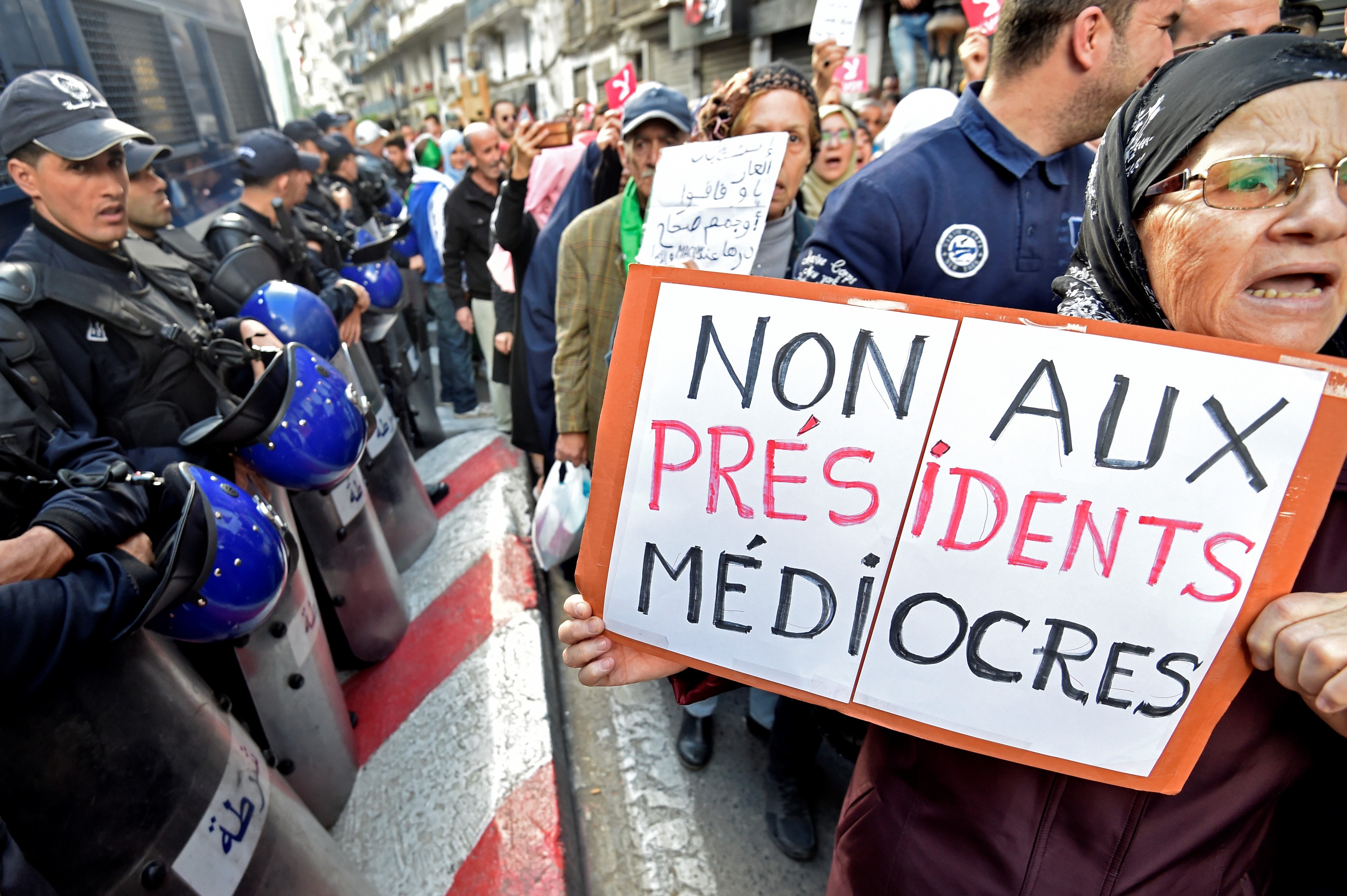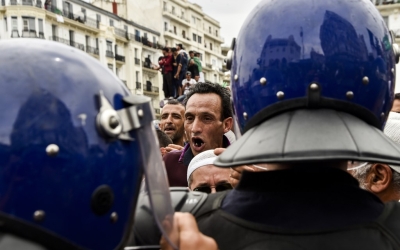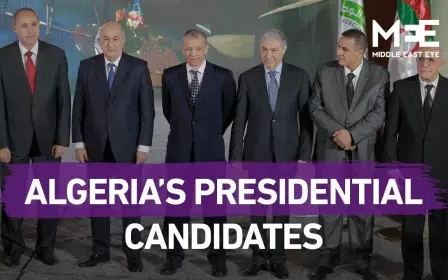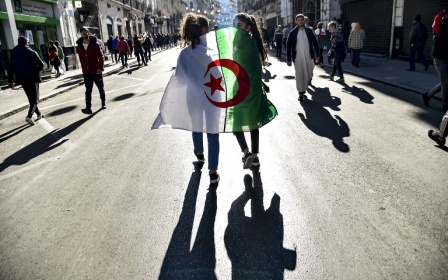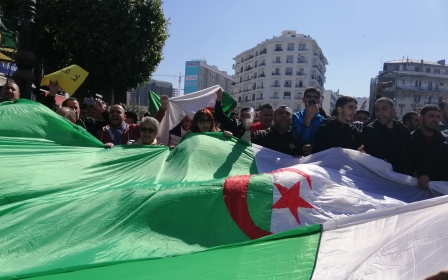Why the presidential election will not solve Algeria's political crisis
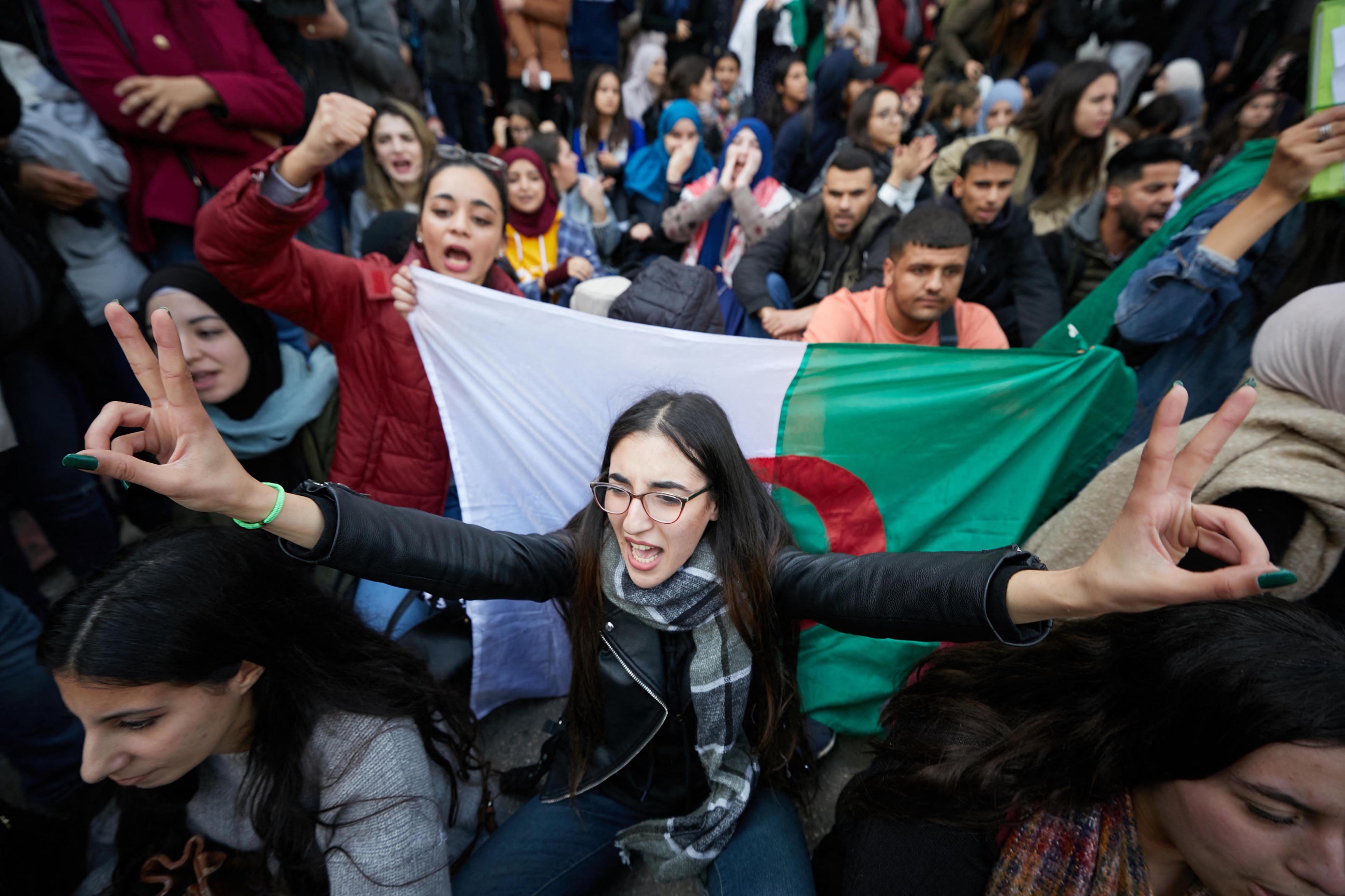
On 10 December, Algerian former Prime Ministers Ahmed Ouyahia and Abdelmalek Sellal were sentenced respectively to 15 and 12 years in prison. Others, among them the ministers of industry, Youcef Yousfi and Mahdjoub Bedda, were sentenced to 10 years in prison, along with several businessmen including Ali Haddad and Hassan Larbaoui .
A few days before, the first-ever televised election debate between the five candidates – all relics of the Bouteflika era – took place in Algeria on 6 December, on the same day protesters held their last Friday rally before the presidential election due on Thursday.
The politico-military leadership
Both these trials and this so-called “historical debate” are masquerades, and many Algerians did not buy into it.
The politico-military leadership has been trying all kinds of subterfuges to convince people that the election is the only way forward and that a vote boycott would constitute a menace to the stability of the country that, according to Chief of Staff Ahmed Gaid Salah, may be "entering the dark tunnel of the constitutional void".
New MEE newsletter: Jerusalem Dispatch
Sign up to get the latest insights and analysis on Israel-Palestine, alongside Turkey Unpacked and other MEE newsletters
The politico-military leadership has been trying all kinds of subterfuges to convince people that the election is the only way forward
While the presidential elections will undoubtedly be held as planned- it has already started abroad - questions remain about how the regime will manage its ongoing crisis of legitimacy. In other words, what is the regime’s next move in the face of the peaceful and massive mobilisation that is showing no signs of abating.
The regime is confronted today with three options. It can continue to disregard people’s demand and count on the exhaustion of the movement, or it can use coercive measures and severely crackdown on the protesters. Lately the security services have been arresting many opposition activists and political figures, and on the eve of the elections, police violently dispersed demonstrators.
A third option would be to start a negotiation process with the protest movement once a new president is elected. Such a move would allow the politico-military leadership to create a modicum of legitimacy for a president who will be lacking one and also avoid violent repression that might drive the country into a cycle of violence.
A new social contract
However, any attempts to negotiate with the protest movement will be confronted by a major obstacle: the vast gap between the protesters and their leaders. While protesters are demanding freedom, liberty, equality and dignity, the politico-military leadership, led by Gaïd Salah, believes that elections are the only solution and the ultimate proof of democracy.
Algerians' rejection of this presidential election has to be understood within their desire to rewrite the social contract
Algerians' rejection of this presidential election has to be understood as emerging from their desire to rewrite the social contract that has enshrined the tyranny of the strongest and the richest.
But this need not imply that there will be no popular participation in the election. Under current conditions, the system can still rely on government organisations and its administration to turn out voters.
The regime has its social base among the remainders of the National Liberation Front (FLN) and its twin, the National Rally for Democracy (RND). In spite of their shortcomings, these parties still have a modest capacity to gather supporters for the election day. Besides, some people will vote because they are convinced that the vote will resolve the political stalemate.
A woman voter in her early 40s, who works for Algerie Telecom pointed out to MEE: "We cannot go on like that indefinitely. I am with the hirak, and I’ve been demonstrating every Friday, yet it is impossible to go on. I will vote because I want this situation to end, and I believe that the new president will negotiate with us […] if he does not, then of course, will be back in the streets."
In a country where there is a profound crisis of legitimacy, a low turnout will further undermine the new president
In addition, the regime is still able to convince many Algerians that a “foreign hand” conspiring against Algeria must be behind what is going on in the country.
Another voter, a retired teacher, explained: “Of course, this is true. Nobody in the region wants Algeria to be a powerful country, especially the French and the Moroccans. They are all conspiring against us […] I saw many things on the internet with proofs that they have a hand in this mess, and they are helped by Algerian khawana [traitors]”.
The regime has launched several media and social media campaigns as fearmongering tactics and organised pre-election rallies to play people off against each other.
These pre-election demonstrations have been, according to the head of the so-called National Independent Authority on Elections, Mohamed Charfi, more frequent and important than those against the vote.
No transparency
Undoubtedly, this election lacks transparency, but there are still two wild cards in this game: to begin with, the turnout. It is expected to be low, yet how low?
There are no public polls available in Algeria to assess the potential participation rate, but as shown in other elections, abstention has been the power used by Algerians for years to resist and show their disagreement with their leaders.
In a country where there is a profound crisis of legitimacy, a low turnout will further undermine a president with an-already fragile legitimacy.
The second variable is the security situation. Tensions have been on the rise for the past few days with Algerians creating new forms of resistance, such as constructing walls around polling stations to prevent voters from reaching them during the election day or burning of ballot boxes in public.
On the other hand, the security forces have been arresting activists, journalists, columnists and political figures. On Tuesday, the police dispersed students harshly.
One thing remains certain: on 13 December, Algeria will have a new president.
A president who does not have popular legitimacy will be anything but a clear break with the ancien regime, a regime where the military will continue to intervene in politics and consolidate its hold on power.
The views expressed in this article belong to the author and do not necessarily reflect the editorial policy of Middle East Eye.
Middle East Eye delivers independent and unrivalled coverage and analysis of the Middle East, North Africa and beyond. To learn more about republishing this content and the associated fees, please fill out this form. More about MEE can be found here.



